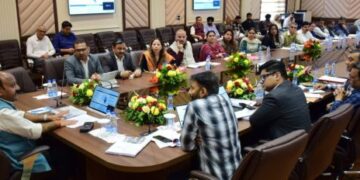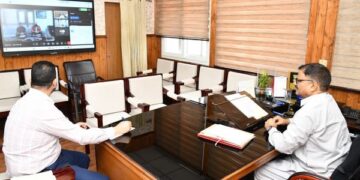New Delhi:Two researchers are set to emerge from a 10-day isolation on Monday at the human outer space exploration (HOPE) outpost in Ladakh that simulates living conditions on the Moon and Mars to help better understand the physiological and psychological aspects of long-duration space travel.
For the first experiment, two researchers — Rahul Mogalapalli and Yaman Akot — started their isolation mission on August 1 at the HOPE analogue site located on the banks of the Tso Kar lake, about 160 km from Leh.
“The aim of the mission was to assess human adaptability and resilience in conditions simulating deep space environments,” Siddharth Pandey, the director of Protoplanet, a company involved in space science popularisation, told PTI.
He said the insights gained from these studies will be instrumental in developing robust protocols and technologies for sustained human presence beyond Earth.
The high-altitude and cold desert-like conditions here serve as an “exceptional analogue site, closely mimicking the geological and environmental conditions found on the Moon and Mars”, the statement noted.
HOPE comprises a specially designed eight-meter diameter habitat module for crew living and a five-meter diameter utility module for operations and support systems, which are interconnected for seamless workflow.
Tso Kar Valley was specifically selected for this analogue mission due to its striking environmental parallels with early Mars, due to high ultraviolet flux, low air pressure, cold extremes and saline permafrost.
Similar to HOPE, there are research stations such as the Mars Desert Station (United States), Flashline Mars Arctic Research Station in Canada and BIOS-3 in Russia, which look to simulate the challenges that astronauts might face in adapting to alien worlds.
The HOPE station is owned and operated by Protoplanet, with contributions from The Mars Society (US and Australia), ISRO’s Human Space Flight Centre, and permissions from the Ladakh Autonomous Hill Development Council.
Experiments from partner institutions such as the Indian Institute for Space Science and Technology, Rajiv Gandhi Centre for Biotechnology, IIT Hyderabad, IIT Bombay, and the Institute for Aerospace Medicine were carried out during the 10-day isolation period.
Investigators from these institutes will examine epigenetic, genomic, physiological and psychological responses of two analogue mission crew members and validate health-monitoring protocols, planetary surface operations, and refine sample collection and microbial analysis techniques.
The data generated through these analogue missions organised by the Human Space Flight Centre of the ISRO will form the basis for the design of protocols and infrastructure for future Indian human exploration missions by providing key insights into technology performance, crew workflows, and environmental adaptation, ISRO said in a statement.
India plans to launch astronauts to space as part of the Gaganyaan project in 2027 and land an Indian on the moon by 2040.
Scientists from ISRO’s Human Space Flight Centre and representatives from the Ladakh government are expected to attend the function on Monday at the Tso Kar Valley site.




